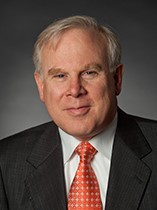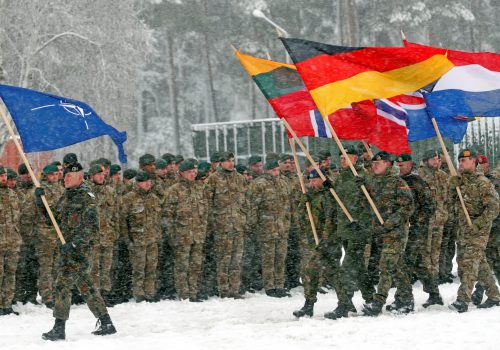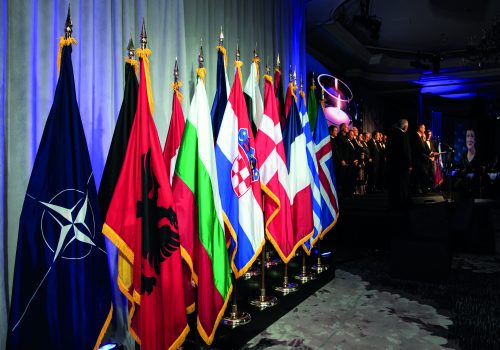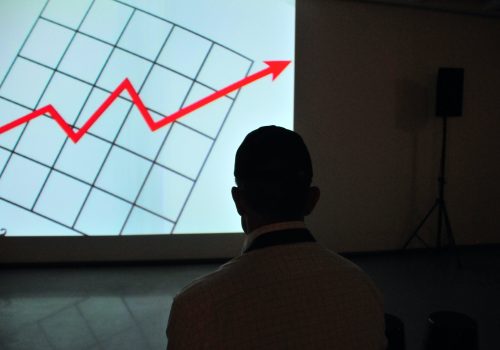I. Annual Report 2019/2020: Introduction
John FW Rogers, Chairman of the Atlantic Council, and Fred Kempe, CEO and President, explain how our past year’s performance, and a dozen years of growth and innovation, helped position us for the historic disruptions of 2020.
It might seem counter-intuitive to look backward in this Atlantic Council Annual Report for 2019 when the world is hurtling forward at warp speed.
Yet it is only by understanding the ingredients involved in our past year’s performance— preceded by a dozen years of growth and innovation—that one can understand why the Atlantic Council has so successfully negotiated the historic disruptions of 2020.
The pages that follow, the Atlantic Council’s Annual Report for 2019, capture what may have been the most successful year in the Atlantic Council’s six-decade existence. That’s certainly true by any financial measure, and that is also underscored in this report’s review of the substantive work of our thirteen programs and centers.
It is that sound foundation that has allowed the Atlantic Council to so effectively navigate the triple shock of 2020: the worst pandemic in a century, the sharpest economic downturn since the Great Depression, and the most significant anti-racism upheavals in more than fifty years.
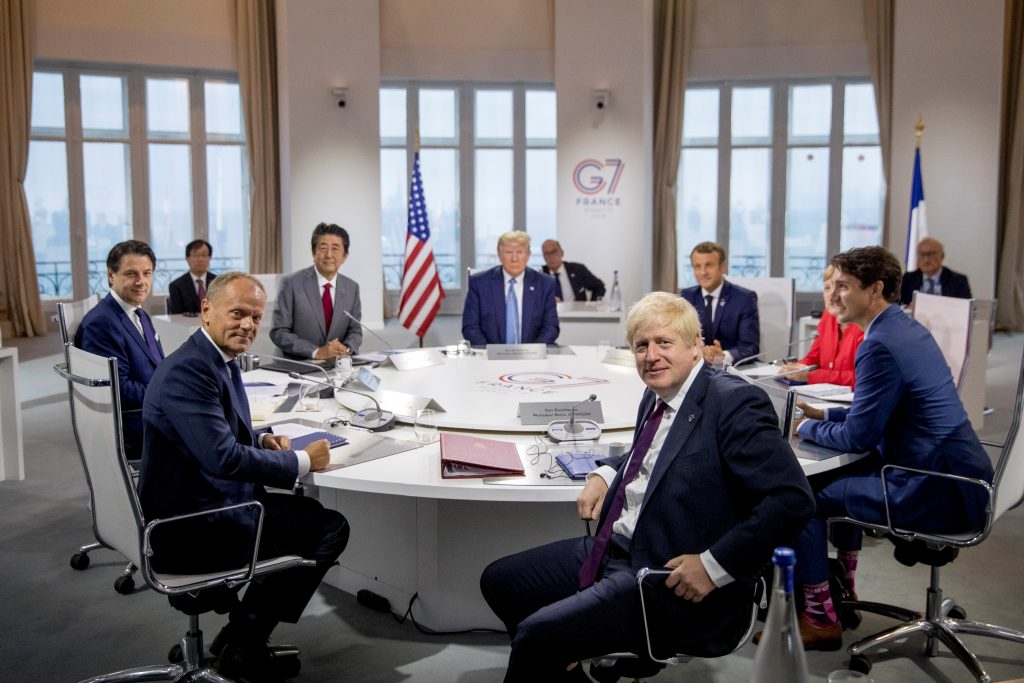
Andrew Harnik/REUTERS
The demand for our published work and convening platform has never been greater from our partners all around the world, as we together seek to understand and manage the impact of these times on our community of values and common interests.
After fewer than four months of working remotely, our website had more than double the number of page views daily than it had in the previous year. Through mid-June, we had staged more than 275 virtual events, some two-thirds of which were public, with more than 600,000 individuals tuned in across all the many digital platforms we employ.
That exponential growth in our global reach through digital innovation will make us even more effective and relevant when we return to our offices later this year.
Above all, we are benefiting from three strengths that were in place before the coronavirus struck: a compelling mission and purpose, a committed global community of stakeholders and donors, and a diverse, dynamic, and results-oriented team.
Let’s take them in order.
Shaping the global future together
First, the short version of our mission statement, “shaping the global future together,” is only five words long, but those words express a world of meaning.
“Shaping” speaks to the results-oriented nature of how we operate. We aspire not just to admire and analyze challenges, but to inspire, seek, and implement solutions wherever possible.
The words that follow, “the global future,” embrace our worldwide outlook and forward-focus.
Yet no word among the five is more powerful to us than “together.” It expresses our intentionally collaborative way of working alongside partners and allies.
We act with the conviction that none of our most significant international challenges can be addressed in national or institutional silos. Common cause has seldom been so vital.
We entered this period with a fundamental belief that the stakes we faced as an Atlantic Council global community were of historic dimensions. Even before COVID-19, we confronted an inflection point in history as significant as those following the first and second world wars. As was the case during those periods, how we navigate the period ahead will have generational consequences.
I’ve recently reread two books of history that provide some perspective— worst-case and best-case—on what’s at stake as we confront this defining moment.
One is Margaret MacMillan’s Paris 1919, which the late Richard Holbrooke in the book’s forward called “a study of flawed decisions with terrible consequences, many of which haunt us to this day.”
President Woodrow Wilson pronounced that the victory in World War I would “make the world safe for democracy.” The writer H.G. Wells called it “the war to end wars.” Instead, that aspirational world unraveled into one of nationalism and fascism, protectionism and global depression, and then World War II and the Holocaust.
The leaders of that day failed to seize their historic opportunity for a host of reasons, including US isolationism and political polarization, European disunity and seething animosities, and a failure by all to foresee the consequences of their actions.
The second book, Dean Acheson’s Present at the Creation, is the memoir of President Harry S. Truman’s secretary of state (and one of the Atlantic Council’s founders). Chastened by the post-World War I experience and galvanized by the Soviet Communist threat, the United States and its allies rose to the challenge after World War II.
Acheson called the task of creating a new world after the wars in Europe and Asia ended in 1945 “as just a bit less formidable than that described in the first chapter of Genesis. That was to create a world out of chaos, ours, to create half a world, a free half, out of the same material without blowing the whole to pieces in the process. The wonder of it is how much was done.”
Our challenge now is no less formidable.
Rather than creating a world out of post-war chaos, as Acheson put it, the task now is to reinvent the world for the 21st century while heading off the myriad threats of disarray that are emerging all around us. The mission is to find novel ways to preserve and improve upon the best of what we have achieved together in the past seventy-five years, knowing that the consequences of failure could be even more horrific than World War II given the war-fighting technologies of our times.
Though the decades since that war have been punctuated with setbacks, the overall trajectory was one of democratic gain and the expansion and protection of individual rights, prosperity, and rules-based institutions.
The United States and the Soviet Union, though both nuclear-armed, avoided major-power war. The Berlin Wall’s fall and Soviet collapse ended that era peacefully.
The Atlantic Council’s most recent strategic review—involving both staff and board members—laid out six major challenges that are at the center of our work for this new epoch.
They include:
- Managing a new era of major-power competition.
- Strengthening open market democracies.
- Redefining and reinvigorating the US role in the world.
- Reinvigorating our rules-based global order.
- Harnessing emerging technologies for good.
- Advancing global resilience through climate-change mitigation and adaptation, and by addressing migratory and public-health challenges.
If the United States rises to this moment, alongside its partners and allies, we can navigate this period successfully, build upon the progress of the past seven decades, and enter one of humanity’s most enlightened and prosperous times. Conversely, history has taught us what a heavy price we will pay should we fail in our efforts.
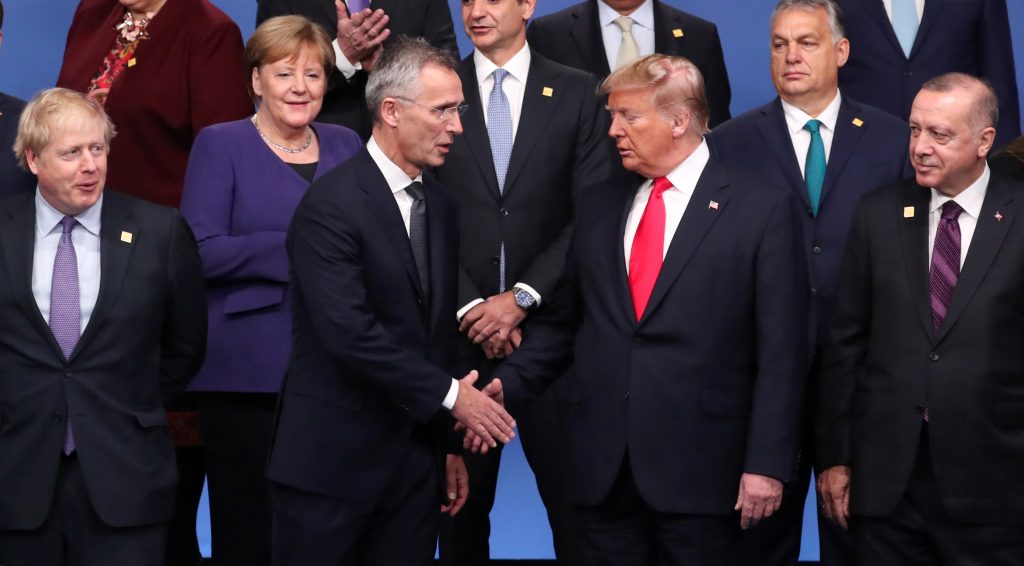
The Atlantic Council community
Second, the Atlantic Council has benefited from a committed community of supporters and partners.
That community includes loyal and generous donors, an engaged Board of Directors and International Advisory Board, and a worldwide group of stakeholders—inside and outside of government—who contribute to our work and benefit from it.
We have found that our most significant partners see themselves as investors in our mission. They embrace our adherence to intellectual independence and transparency regarding our donors.
In 2020, for the sixth year running, the Atlantic Council was recognized with a four-star Charity Navigator rating, recognizing our commitment to industry best practices regarding both our financial health and our accountability and transparency.
It is support from this committed community that has empowered the innovations that have shaped the Atlantic Council over the past dozen years.
The decisions of board members and International Advisory Board members to name centers and fellows have helped unlock the value of the Atlantic Council. Most prominent and enduring among these members have been Adrienne Arsht, Boyden Gray, Bahaa Hariri, and Brent Scowcroft.
The Atlantic Council has also enjoyed four significant chapters of board leadership in the past dozen years, serving to reorient the institution and then remake it as a global leader in its field while consistently refreshing the board.
These leaders have included Ambassador Henry Catto (1999– 2007), General (ret.) James L Jones (2007–2009; 2017– 2018), Senator (later Secretary of Defense) Chuck Hagel (2009–2013), Gen (ret.) Brent Scowcroft (long the organization’s driving force, (1998–1999; 2013–4), and Jon M. Huntsman, Jr.
The Atlantic Council’s results-oriented culture
Third, and perhaps most crucially, the Atlantic Council over the last decade has transformed its culture into that of a faster-paced, innovative, and results-oriented organization. Its teams have become part of the daily policy mix, responding to world-shaping events at the speed with which they unfold even while engaging in the deeper strategic thinking and work required by our times.
To nurture that culture, the Atlantic Council has welded a more dynamic operating rhythm onto the foresight and analytical capabilities of our expert staff and board. The approach recognizes that while policy makers must often make their most significant decisions in the heat of events, those decisions turn out best when they are informed by strategic purpose and consistency.
The Atlantic Council recruits its staff with the intentional aim of forging a diverse, dynamic team of collegial, collaborative, optimistic, results-oriented, nonpartisan, and entrepreneurial individuals. They are armed with deep content-area expertise.
The legendary management consultant Peter Drucker famously wrote that “culture eats strategy for breakfast.” We would extend that to all other meals of the day. Developing the right strategy achieves little without the right culture to deliver on it.
The work of building and sustaining our culture is continuous, as we learned again this year when we took additional measures to make the Atlantic Council even more diverse after the tragic killing of George Floyd on May 25, 2020, and the events that followed.
The steps we took included the introduction and design of a fully paid internship program so that it will be far more diverse, inclusive, and competitive. The program will serve as a career accelerator for the next generation of international policy leaders.
Among many other measures, we also added anti-bias training to our respectful-workplace workshops and launched a Diversity, Equity, and Inclusion Council to ensure our efforts and policies are best-in-class. Our substantive programming will also be expanded to look at the crucial domestic underpinnings of effective US foreign policy.
We like to quote the anthropologist Margaret Mead when people ask whether the Atlantic Council is setting the bar too high for itself.
“Never doubt that a small group of thoughtful, committed citizens can change the world,” she said. “Indeed, it’s the only thing that ever has.”
No organization of our kind has ever achieved great results by aiming too low.
Twelve Years of Growth
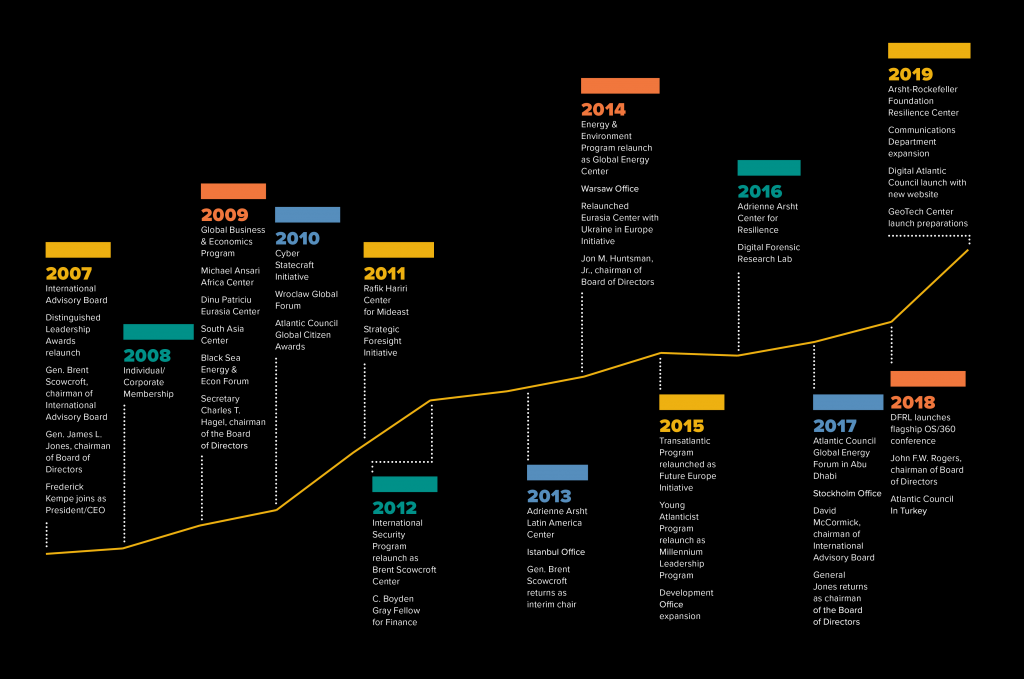
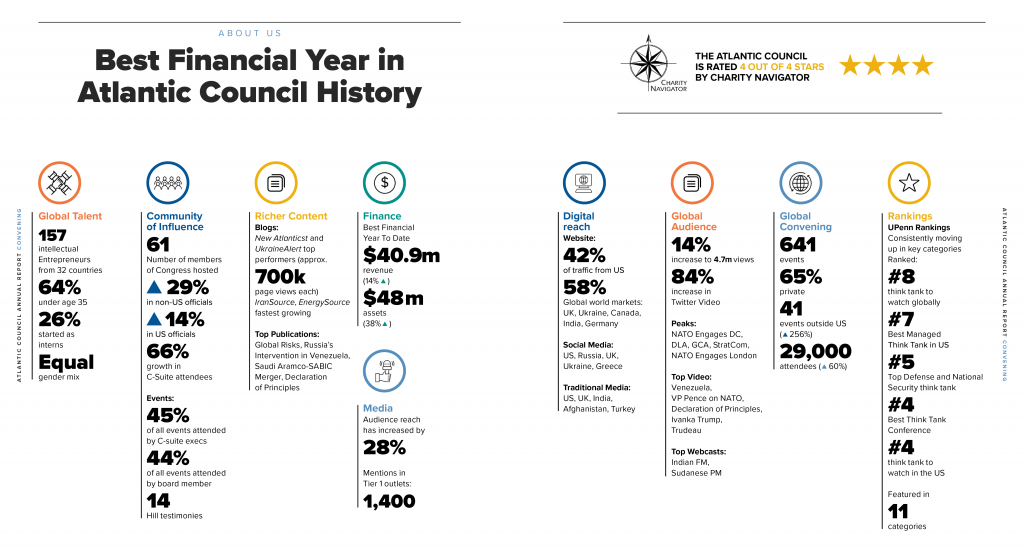
Next:
Read the full report:
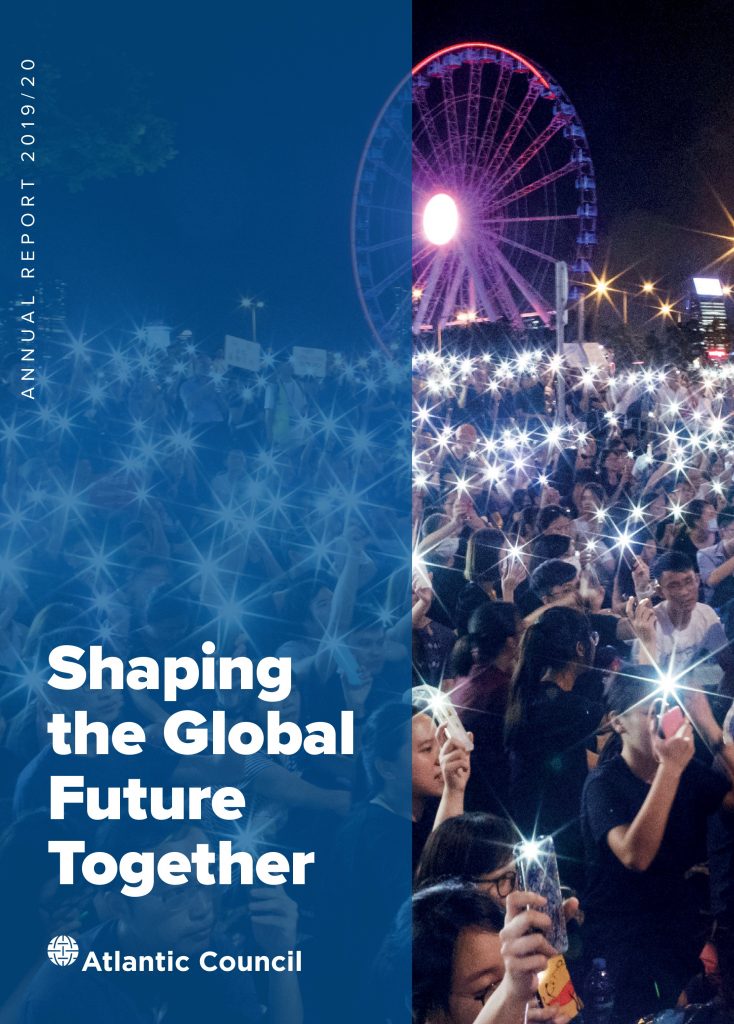
Annual Report 2019/2020
John FW Rogers, Chairman of the Atlantic Council, and Fred Kempe, CEO and President, explain how our past year’s performance, and a dozen years of growth and innovation, helped position us for the historic disruptions of 2020. Read the full introduction.
Image: Image: Workers make final preparation to raise up the art installation "Visions in Motion" at Brandenburg Gate in Berlin, Germany, November 1, 2019. REUTERS/Fabrizio Bensch
